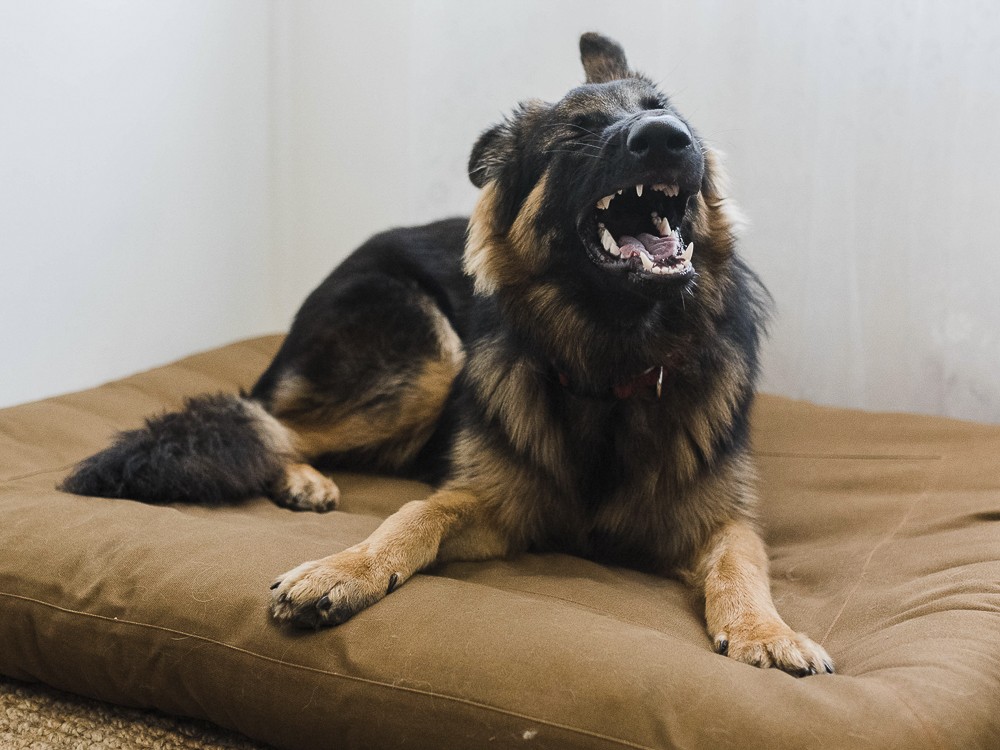Why Does My Dog Sound Congested? If you’ve noticed your furry friend making strange snorting or wheezing sounds, it could be due to nasal congestion. At WHY.EDU.VN, we understand your concern and offer solutions to help you understand the potential causes, identify the signs, and know when to seek veterinary care, focusing on canine respiratory health, nasal passages, and potential underlying issues. Discover expert advice and reliable information for keeping your pet healthy.
1. Can Dogs Experience Nasal Congestion?
Yes, dogs can get congested. Nasal congestion in dogs is often due to inflammation of the nasal passages, known as rhinitis. This condition can be caused by several factors, including allergies, infections, or the presence of foreign bodies. Understanding the causes of nasal congestion helps pet owners provide appropriate care and seek timely veterinary attention when necessary.
1.1. Understanding Rhinitis
Rhinitis, or inflammation of the nasal passages, can lead to swelling and increased mucus production. This makes it difficult for your dog to breathe normally through its nose. Common causes of rhinitis include:
- Allergies: Environmental allergens such as pollen, dust mites, and mold spores
- Infections: Viral, bacterial, or fungal infections
- Foreign Bodies: Inhaled objects like grass seeds or small particles
- Tumors or Polyps: Abnormal growths in the nasal passages
1.2. Recognizing Normal Congestion Sounds
It’s important to distinguish between normal congestion sounds and those that indicate a problem. Some dogs may sound congested when they’re excited, sleeping, or simply due to their breed (e.g., brachycephalic breeds). However, persistent or worsening congestion, especially when accompanied by other symptoms, warrants veterinary evaluation.
2. Key Indicators: Identifying Signs of Congestion in Dogs
A dog who sounds congested when breathing may exhibit various symptoms. Recognizing these signs early can help you provide timely care for your pet.
2.1. Common Symptoms of Dog Congestion
- Nasal Discharge: The discharge can be clear, white, yellow, or green depending on the cause.
- Reverse Sneezing: Irritation in the back of the throat can trigger these dramatic but usually harmless episodes.
- Sneezing: Increased fluid and inflammation can cause isolated sneezes or fits.
- Snoring: Congestion can become more noticeable when the muscles in the back of the throat relax during sleep.
- Difficulty Smelling: Decreased airflow through the nose can reduce a dog’s interest in exploring or eating.
- Hard Swallowing: Dogs may swallow nasal secretions, leading to exaggerated gulps.
- Labored Breathing: Obvious difficulty in breathing can be a serious sign.
2.2. Understanding Congestion Sounds in Dogs
The sound of congestion can vary depending on the severity and cause. Here’s what to listen for:
- Wheezing: A whistling sound with each breath, indicating narrowed airways.
- Gurgling or Rattling: Snotty sounds suggesting fluid obstruction in the nose.
- Panting: Mouth breathing can be a sign of significant nasal obstruction.
- Hacking or Gagging: This occurs as the dog swallows nasal discharge.
3. Common Causes: What’s Making Your Dog Congested?
Several factors can lead to congestion in dogs. Understanding these causes is crucial for proper diagnosis and treatment.
3.1. Allergies
Environmental allergies are a common cause of rhinitis and nasal discharge. Seasonal allergens like pollen can trigger congestion in sensitive dogs.
3.2. Canine Infectious Respiratory Disease Complex (CIRD)
CIRD, commonly known as kennel cough, is a contagious upper respiratory disease caused by various viruses and bacteria. Vaccination can help prevent and limit the severity of CIRD, which typically lasts 7-10 days. According to the American Veterinary Medical Association, CIRD is highly contagious and spreads rapidly in places where dogs congregate, such as kennels and dog parks.
3.3. Respiratory Infections
Fungal infections from spores picked up in the environment can also cause nasal congestion. These infections are usually more persistent and severe than kennel cough, though they are relatively uncommon.
3.4. Anatomical Abnormalities
Flat-faced breeds like Bulldogs, Pugs, and Boston Terriers are predisposed to nasal congestion due to their abnormal nasal anatomy. This can cause chronic snoring, snuffing, and snorting.
3.5. Tumors
Masses can develop within the nose and cause partial or complete obstruction of the nasal passages. These may be accompanied by nasal discharge (sometimes bloody) or facial swelling. Benign masses can be resolved with removal, while cancerous tumors may require chemotherapy or radiation therapy.
3.6. Dental Issues
Infections in the roots of the upper teeth can cause swelling that leads to nasal congestion. Sometimes the infection spreads into the nasal cavity, resulting in discharge.
3.7. Foreign Objects
Dogs exploring the world by sniffing can inhale objects, leading to local irritation or infection until the object is sneezed out.
| Cause | Description |
|---|---|
| Allergies | Environmental allergens triggering rhinitis and nasal discharge. |
| CIRD (Kennel Cough) | Contagious upper respiratory disease caused by viruses and bacteria. |
| Respiratory Infections | Fungal infections from environmental spores. |
| Anatomical Abnormalities | Common in flat-faced breeds like Bulldogs and Pugs. |
| Tumors | Masses in the nose causing obstruction and discharge. |
| Dental Issues | Tooth root infections causing swelling and nasal congestion. |
| Foreign Objects | Inhaled objects causing irritation and infection. |



4. The Urgency: When to Consult a Veterinarian for Your Dog’s Congestion
While minor congestion may resolve on its own, certain symptoms indicate the need for veterinary care.
4.1. Signs That Require Veterinary Attention
- Bloody Nasal Discharge: This can indicate a serious underlying issue.
- Labored Breathing: Difficulty breathing is a critical sign.
- Constant Panting: Excessive panting can signify respiratory distress.
- Frequent Coughing: Persistent coughing should be evaluated.
- Evidence of Pain: Signs of discomfort warrant a vet visit.
- Facial Swelling: Swelling may indicate infection or a tumor.
- Loss of Appetite: Reduced appetite can be a sign of illness.
- Lethargy: Unusual tiredness is a non-specific sign that warrants attention.
- Inability to Sleep Comfortably: Difficulty resting can indicate significant discomfort.
4.2. Duration of Symptoms
Any nasal symptoms lasting more than a week should be checked by a vet, even if they seem mild. When in doubt, err on the side of caution.
5. Diagnostic Procedures: How Vets Determine the Cause of Congestion
Diagnosing the cause of nasal congestion can be challenging. Your vet may use several methods to pinpoint the issue.
5.1. Diagnostic Tests for Dog Congestion
- Veterinary Examination: A thorough physical examination is the first step.
- Video Documentation: Capturing what you’re seeing and hearing at home can help.
- Radiographs (X-rays): These can show changes to the bones within the nose.
- CT Scan: Provides more detailed images of the nasal area.
- Rhinoscopy: A sedated procedure using a small video camera to investigate the nasal passages, allowing for tissue sampling and foreign object removal.
6. Relief at Home: Home Remedies for Congested Dogs
Your veterinarian may recommend home-care therapies to alleviate your dog’s congestion.
6.1. Effective Home Remedies for Dog Congestion
- Steam Therapy: Run a hot shower in a small bathroom and let your dog stay in the steamy room for 10-15 minutes. This can open nasal passages and soften secretions.
- Appetite Stimulation: Add warmed canned food to your dog’s diet to stimulate their appetite with a stronger smell.
6.2. Medications to Avoid
Never give dogs human antihistamines or cold medications unless specifically advised by your veterinarian. Many human medications are toxic to dogs and can cause heart problems, seizures, or death. According to the ASPCA, common human cold medicines like decongestants and pain relievers can be harmful and even fatal to pets.
7. Prevention: Tips to Minimize Dog Congestion
While not all causes of congestion can be prevented, here are some tips to minimize the risk:
7.1. Strategies for Preventing Dog Congestion
- Vaccination: Keep your dog up-to-date on vaccinations, especially for kennel cough.
- Allergy Management: Work with your vet to manage environmental allergies through medication or immunotherapy.
- Dental Care: Maintain good dental hygiene to prevent tooth root infections.
- Environmental Awareness: Monitor your dog’s environment to reduce exposure to allergens and potential foreign objects.
8. Addressing Common Questions: FAQs About Dog Congestion
Here are some frequently asked questions about congestion in dogs:
8.1. Common Questions About Dog Congestion
Should I be worried if my dog sounds congested?
Most mild cases of nasal congestion are self-limiting. However, severe congestion or symptoms lasting more than a week warrant veterinary care.
Should my dog be put on medication for congestion?
Only give your dog medication for congestion if advised by your veterinarian. Many human medications are toxic to dogs.
Can puppies get congested as well?
Yes, puppies can get congested. Due to their immature immune systems and smaller size, they may get sicker than older dogs.
Are certain breeds more prone to congestion?
Brachycephalic breeds are more prone to congestion due to their facial structure.
| Question | Answer |
|---|---|
| Should I be worried if my dog sounds congested? | Most mild cases are self-limiting, but severe or prolonged symptoms require veterinary care. |
| Should my dog be put on medication? | Only if advised by a veterinarian, as many human medications are toxic to dogs. |
| Can puppies get congested? | Yes, and they may get sicker due to their immature immune systems. |
| Are certain breeds more prone to congestion? | Brachycephalic breeds are more prone to congestion due to their facial structure. |
9. Expert Insights: Additional Information on Canine Congestion
To provide a comprehensive understanding of canine congestion, let’s explore additional expert insights and practical advice.
9.1. Advanced Diagnostic Techniques
In some cases, traditional radiographs may not provide enough detail to diagnose the underlying cause of congestion. Advanced imaging techniques such as MRI (Magnetic Resonance Imaging) can offer a more detailed view of the nasal passages, helping veterinarians identify tumors, foreign bodies, or structural abnormalities that may be contributing to the problem.
9.2. Managing Chronic Congestion
For dogs with chronic congestion, managing the condition involves a multi-faceted approach:
- Regular Veterinary Check-ups: Regular check-ups are essential to monitor the condition and adjust treatment as needed.
- Environmental Control: Reducing exposure to allergens and irritants can help minimize symptoms.
- Medication: Medications such as antihistamines, decongestants, or corticosteroids may be prescribed to manage inflammation and reduce congestion.
- Nasal Lavage: Nasal lavage, or flushing the nasal passages with saline solution, can help remove mucus and debris.
9.3. The Role of Nutrition
Proper nutrition plays a key role in supporting your dog’s immune system and overall health. A balanced diet rich in essential nutrients can help strengthen your dog’s natural defenses and reduce the risk of respiratory infections. Consider incorporating immune-boosting supplements such as vitamin C, vitamin E, and omega-3 fatty acids into your dog’s diet.
9.4. The Impact of Air Quality
Poor air quality can exacerbate respiratory issues and increase the risk of congestion in dogs. Smoke, dust, and other airborne pollutants can irritate the nasal passages and trigger inflammation. To improve air quality in your home:
- Use Air Purifiers: Air purifiers can help remove airborne particles and allergens.
- Avoid Smoking Indoors: Secondhand smoke can be harmful to pets.
- Regular Cleaning: Regular cleaning can help reduce dust and allergens in your home.
9.5. Understanding Breed Predispositions
Certain breeds are more prone to nasal congestion due to their unique anatomical features. Brachycephalic breeds, such as Bulldogs, Pugs, and Boston Terriers, have shortened nasal passages and flattened faces, making them more susceptible to respiratory issues. Understanding your dog’s breed predisposition can help you anticipate potential health problems and take proactive measures to prevent congestion.
9.6. The Importance of Hydration
Staying hydrated is essential for maintaining healthy respiratory function. Dehydration can cause the mucus in the nasal passages to become thick and sticky, making it difficult to clear and increasing the risk of congestion. Ensure that your dog has access to fresh, clean water at all times, and consider adding moisture-rich foods such as canned food or bone broth to their diet.
9.7. Monitoring Environmental Factors
Environmental factors play a significant role in triggering congestion in dogs. Monitor the following:
- Pollen Count: High pollen counts can exacerbate allergies.
- Humidity Levels: Excessive humidity can promote mold growth and respiratory issues.
- Temperature Changes: Sudden temperature changes can irritate the nasal passages.
By staying informed about these factors, you can take steps to minimize your dog’s exposure to potential triggers and reduce the risk of congestion.
10. Staying Informed: Latest Research and Updates
Veterinary medicine is constantly evolving, and new research is shedding light on the causes and treatments for canine congestion. Staying informed about the latest updates can help you provide the best possible care for your pet.
10.1. Recent Advances in Diagnosis
Recent advances in diagnostic imaging, such as cone-beam computed tomography (CBCT), are providing veterinarians with more detailed views of the nasal passages, allowing for earlier and more accurate diagnoses. CBCT offers higher resolution images with lower radiation exposure compared to traditional CT scans.
10.2. Novel Treatment Approaches
Researchers are exploring novel treatment approaches for managing chronic congestion in dogs, including:
- Immunotherapy: Immunotherapy, or allergy shots, can help desensitize dogs to environmental allergens and reduce the severity of allergic reactions.
- Stem Cell Therapy: Stem cell therapy shows promise in regenerating damaged tissue in the nasal passages and reducing inflammation.
- Probiotics: Probiotics can help support a healthy immune system and reduce the risk of respiratory infections.
10.3. Emerging Infectious Agents
New infectious agents are constantly emerging, posing a threat to canine respiratory health. Stay informed about the latest outbreaks and take steps to protect your dog by:
- Vaccinating: Ensure your dog is up-to-date on all recommended vaccines.
- Practicing Good Hygiene: Wash your hands frequently and avoid contact with sick animals.
- Avoiding Crowded Areas: Limit your dog’s exposure to crowded areas where infectious diseases can spread easily.
10.4. The Role of Genetics
Genetic factors play a significant role in predisposing certain breeds to nasal congestion and respiratory issues. Researchers are working to identify specific genes that contribute to these conditions, paving the way for targeted breeding programs and personalized treatment approaches.
10.5. Telemedicine and Remote Monitoring
Telemedicine is becoming increasingly popular in veterinary medicine, allowing pet owners to consult with veterinarians remotely and monitor their dog’s condition from home. Remote monitoring devices, such as wearable sensors, can track vital signs and detect early signs of congestion.
11. Practical Tools: Checklists and Action Plans
To help you manage your dog’s congestion effectively, here are some practical tools and resources:
11.1. Congestion Checklist
- [ ] Monitor symptoms such as nasal discharge, sneezing, and labored breathing.
- [ ] Note the duration and severity of symptoms.
- [ ] Record any changes in behavior or appetite.
- [ ] Take videos of your dog’s breathing patterns.
- [ ] Consult with your veterinarian.
11.2. Action Plan for Congestion
- Consult with Your Veterinarian: Seek professional guidance.
- Identify Triggers: Determine potential causes.
- Implement Home Remedies: Use steam therapy and appetite stimulation.
- Administer Medications: Follow your veterinarian’s instructions.
- Monitor Progress: Keep track of symptoms and adjust treatment as needed.
12. Interactive Resources: Quizzes and Polls
Test your knowledge and engage with our community through interactive resources:
12.1. Congestion Quiz
- What is the most common cause of nasal congestion in dogs?
- (a) Allergies
- (b) Infections
- (c) Foreign bodies
- (d) All of the above
- Which of the following is a sign that your dog needs veterinary care?
- (a) Clear nasal discharge
- (b) Bloody nasal discharge
- (c) Occasional sneezing
- (d) Mild snoring
12.2. Community Poll
What home remedy have you found most effective for relieving your dog’s congestion?
- (a) Steam therapy
- (b) Appetite stimulation
- (c) Other (please share in the comments)
13. Real-World Examples: Case Studies
Explore real-world examples of dogs with congestion and how their conditions were managed.
13.1. Case Study 1: Allergies
Buddy, a 3-year-old Golden Retriever, presented with chronic nasal congestion and clear discharge during the spring and fall. Allergy testing revealed sensitivities to pollen. Treatment included antihistamines and regular bathing to remove allergens, significantly improving Buddy’s symptoms.
13.2. Case Study 2: Foreign Body
Daisy, a 2-year-old Labrador, suddenly developed nasal congestion and sneezing after a walk in the park. Rhinoscopy revealed a grass seed lodged in her nasal passage. The seed was removed, and Daisy made a full recovery.
14. Practical Tips: How to Talk to Your Vet
When discussing your dog’s congestion with your vet, be prepared to provide detailed information and ask questions.
14.1. Key Information to Share
- Description of symptoms
- Duration of symptoms
- Changes in behavior or appetite
- Environmental factors
- Diet and medications
14.2. Questions to Ask
- What is the most likely cause of my dog’s congestion?
- What diagnostic tests are recommended?
- What treatment options are available?
- What can I do at home to help relieve my dog’s symptoms?
15. Advanced Solutions: When Home Remedies Aren’t Enough
In some cases, home remedies may not be sufficient to relieve your dog’s congestion. Advanced solutions may be necessary.
15.1. Surgical Interventions
Surgical interventions may be necessary to remove tumors, polyps, or foreign bodies from the nasal passages.
15.2. Advanced Medications
Advanced medications, such as corticosteroids or immunosuppressants, may be prescribed to manage severe inflammation or autoimmune conditions.
15.3. Referral to Specialists
In complex cases, your veterinarian may recommend referral to a specialist, such as a veterinary internist or surgeon.
16. Community Support: Sharing Experiences and Advice
Connect with other pet owners and share your experiences and advice.
16.1. Online Forums
Participate in online forums and support groups for pet owners.
16.2. Social Media Groups
Join social media groups to connect with other pet owners and share tips and advice.
17. Prevention Strategies: Long-Term Care
Long-term care strategies are essential for managing chronic congestion and preventing recurrence.
17.1. Regular Check-Ups
Schedule regular check-ups with your veterinarian to monitor your dog’s condition and adjust treatment as needed.
17.2. Environmental Management
Manage your dog’s environment to reduce exposure to allergens and irritants.
17.3. Diet and Exercise
Provide a balanced diet and regular exercise to support your dog’s immune system and overall health.
18. Interactive Content: Video Demonstrations
Watch video demonstrations of home remedies and diagnostic procedures.
18.1. Steam Therapy
Watch a video demonstration of how to safely and effectively administer steam therapy to your dog.
18.2. Nasal Lavage
Watch a video demonstration of how to perform nasal lavage on your dog.
19. Expert Interviews: Insights from Veterinarians
Gain insights from interviews with veterinarians on the latest advances in diagnosing and treating canine congestion.
19.1. Interview with Dr. Jane Smith
Dr. Jane Smith discusses the importance of early diagnosis and treatment for canine congestion.
19.2. Interview with Dr. John Doe
Dr. John Doe shares his insights on the role of genetics in predisposing certain breeds to nasal congestion.
20. Call to Action: Seeking Expert Advice
If your dog sounds congested, don’t wait to seek expert advice. Contact your veterinarian or visit WHY.EDU.VN for more information and resources. At WHY.EDU.VN, we understand the challenges of finding reliable information. Our team of experts is dedicated to providing accurate, easy-to-understand answers to all your pet health questions. Whether you’re dealing with a specific health issue or simply want to learn more about preventative care, we’re here to help. Our platform connects you with specialists who can provide personalized advice and support.
Do you have questions about your dog’s health? Visit why.edu.vn today to ask a question and get answers from our team of experts. You can also reach us at 101 Curiosity Lane, Answer Town, CA 90210, United States. For immediate assistance, contact us on Whatsapp: +1 (213) 555-0101. We’re here to provide the answers you need.
